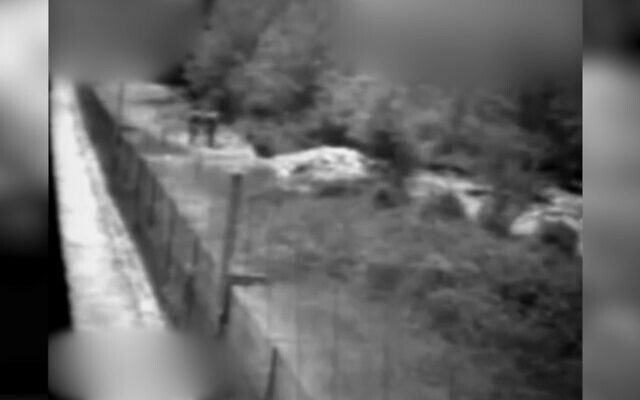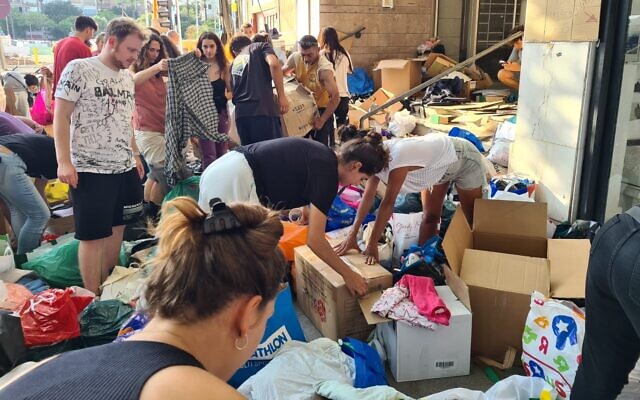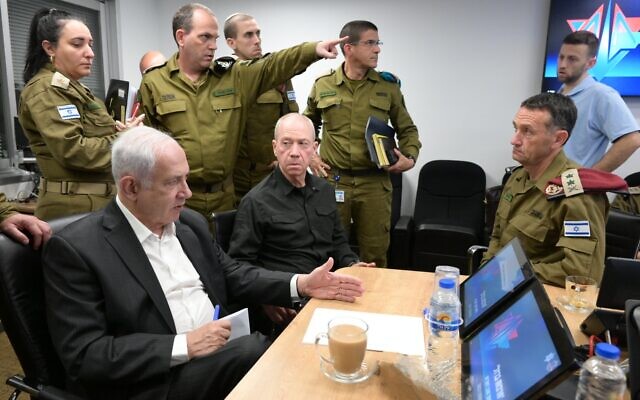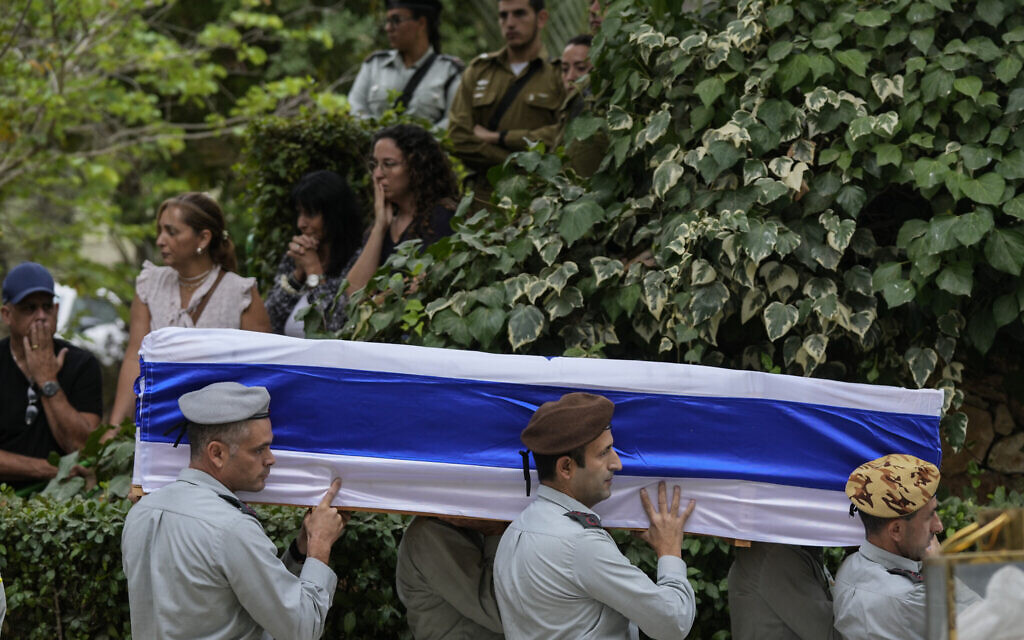With every passing hour since hundreds of Hamas gunmen burst across the Gaza border on Saturday morning, Prime Minister Benjamin Netanyahu’s warning to Israelis that we face “difficult days ahead” has acquired ever greater resonance.
1. Complacency: Comparisons with the failures that preceded the Yom Kippur War 50 years ago, invoked immediately after the sirens rang out early on Saturday morning, have become not only unavoidable but, in many respects, a matter of understatement.
As in 1973, Israel underestimated and misread its enemies — not the conventional forces of the Arab armies this time, but the terrorists of Gaza, supported by the state sponsor of terrorism Iran.
Israel convinced itself that Hamas’s overt preparations for war — its training of gunmen, its construction of underground tunnels, its subversion of all potential materials for the manufacture of weapons, the improvement and testing of its rockets and its drones, its preparations for infiltration by sea and via hang gliders, its deployment of explosive devices at the border fence, and more — did not herald what they patently heralded and what has now come to pass: a massive cross-border attack designed to kill vast numbers of Israelis, take control of areas of southern Israel close to the border, and abduct Israelis into Gaza.
All the signs were there, in plain sight; they were ignored.
2. Belated response: The Hamas invasion left the IDF unimaginably hamstrung. The painstakingly constructed, sophisticated Israel-Gaza border fence, designed with a high focus on preventing Gaza’s terrorists from tunneling into Israel, was simply blown up at multiple locations, and hundreds of gunmen poured into Israel.
Amid the simultaneous vast rocket barrages at south and central Israel, and the targeting of IDF bases in the border area, notably including the IDF’s nearby divisional headquarters, it then took the army unthinkably long to internalize what was unfolding and begin to respond.
Too few troops were deployed on the ground in the area, with reports saying that the IDF was preoccupied with its obligations in the West Bank. But why the Israeli Air Force was so slow to respond effectively, notwithstanding claims about Hamas having blocked communications and other systems, will be just one of the many crucial issues to be addressed as the military investigates and learns from the disaster.
“What has been happening here is unforgivable,” former air force chief Eitan Ben Eliyahu said on Sunday. “How can we have been so surprised [by the onslaught]?… And where was the IAF [once it had begun]?”

Shye Weinstein (left) and a presumed security guard at the Kibbutz Re’im Nature Party before the gunfire began, October 7, 2023. (courtesy Shye Weinstein)
By the time the IDF was moving to thwart gunmen at the border, hundreds had already made their way deep into Israel, and entered towns, kibbutzim and moshavim, where they proceeded to massacre our people. It has been widely asserted that Hamas knew all about the huge “nature” party near Kibbutz Re’im, which was after all widely publicized, where Israelis were slaughtered in unimaginable numbers. It has also been widely reported that the gunmen who infiltrated border towns and communities knew precisely where the synagogues were — this being Shabbat and a festival — and headed to them.
For hours and hours on Saturday, Israeli civilians in innumerable places where Hamas and Islamic Jihad gunmen were murdering with abandon pleaded by every means of communication for the IDF to come and save them. In innumerable cases, they pleaded in vain. In many cases, civilians heroically battled the terrorists or somehow found ways to survive, sometimes prevailing in barely conceivable circumstances.

Screen capture from video of Rachel describing how she surreptitiously indicated to police how many terrorists were holding her captive in her home in Ofakim, October 8, 2023. (Channel 13. Used in accordance with Clause 27a of the Copyright Law)
3. Terrorists still here: Having failed to internalize what was about to happen, and proven unconscionably slow to respond, the IDF, as I write on day three of this war, has just announced that it has regained “control” of Gaza border residential areas, but believes there are still terrorists on the loose inside Israel, and is still battling gunmen at the border, which has not been resealed.
The assumption conveyed by senior politicians and security officials since late Saturday that the threat posed by Hamas gunmen inside Israel was over, or very soon would be, and that the focus had already turned to hitting back at Hamas to ensure no repeat has proven bitterly premature.
Rocket fire continues frequently, with sirens wailing and thuds audible right now, right here, in central Jerusalem as I write, and much of south and central Israel ordered into saferooms to shelter from the barrages.
4. Ground offensive: Israel is already hitting back at terror targets in Gaza, to considerable effect — with hundreds of gunmen killed and facilities destroyed, though Hamas patently remains potent.
For the IDF to restore any sense of security for southern Israel, to begin to restore Israelis’ trust in the abilities of their military chiefs and their political masters, and to deter other still more potent enemies on other fronts, it will indeed have to do what Netanyahu has promised — to destroy Hamas’s military capabilities, which is, of course, tantamount to destroying Hamas.
As years of intermittent conflict have proved, achieving that goal from the air is simply impossible. Even as the IDF continues to grapple with Hamas inside Israel, therefore, it is gathering forces and preparing for an expected major ground offensive. Israeli governments have been immensely wary of sending ground forces deep into Gaza in recent years, knowing that Hamas is waiting for them on its home territory and that the toll of soldiers’ lives will be high. That calculation has been remade amid the mounting toll inside Israel, with a staggeringly high proportion of civilians among the dead.
5. Multiple fronts: A potent Israeli offensive in Gaza carries the dangers, too, of this war expanding to one or several more additional fronts. Hamas has been encouraging West Bank Palestinians, East Jerusalem Arabs and Arab Israeli citizens to take up arms. A central question is whether Hezbollah, a veritable army with an immense rocket arsenal, will enter the conflict. There is concern that it will do so if it sees the IDF succeeding in the declared mission of thoroughly defanging Hamas; it may equally do so if the IDF does not prove capable of reasserting deterrence.

Hezbollah members are seen approaching the border between Israel and Lebanon, before the IDF sets off a blast scaring them away, July 12, 2023. (Israel Defense Forces)
It is worth noting, in this context, that Hezbollah has also been openly preparing for cross-border incursions, drilling to burst through the border and seize control of border-adjacent communities.
Senior retired IDF officers are warning, however, against the IDF embarking over-hastily on the ground offensive, stressing the imperative for careful, clearheaded preparation. The offensive, noted former IDF Military Intelligence chief Amos Yadlin on Sunday, requires logistical and practical preparation, and for Gaza to “look different” before the troops go in — a reference to the ongoing IAF strikes on terror targets in the Strip.
Israel must also take the war to the enemy in Gaza, and must deal the heaviest of blows, in a situation immensely complicated by the unprecedented presence in Hamas and Islamic Jihad captivity of an estimated hundred-plus Israelis — soldiers and civilians.
6. Crises of faith: After months of unprecedented national division surrounding the hardline agenda of the Netanyahu government, Israel has been mustering essential unity as the war has unfolded — with reservists reporting for emergency duty; protest organizers redirecting their efforts to support systems, especially for residents of the south; innumerable grassroots initiatives on behalf of soldiers and civilians, and politicians largely eschewing divisive utterances and blame gaming.

A clothing and equipment drive on King David Blvd in Tel Aviv for residents in the south and soldiers, on October 8, 2023. (Lizzy Shaanan/Courtesy)
But the war — what preceded it and how it has been unfolding — will continue to challenge national cohesion. Much of the worst of what has happened to so many Israeli civilians, and to so many of our protectors, has not yet been fully exposed, much less internalized.
It is being credibly said that Saturday was the most terrible day for the Jews since the Holocaust, the highest number of Jews killed in a single day since that darkest era — a time of utter vulnerability that the establishment and fierce, efficient defense of this state was designed, more than anything else, to ensure cannot recur.
There are communities near Gaza where, multiple reports indicate, 10 or even 20 percent of the residents have been killed. The hours are punctuated with the release of name after name after name of our murdered people. The families of the dead will never fully recover. Those of the missing and the abducted are desperate, and, after two days in which some went hospital to hospital searching, are only, belatedly, now beginning to get some answers from those in authority.
There is, to put it carefully, something of a crisis of faith between the people and those with the responsibility to protect them — the most basic obligation of government. And there is, again to put it carefully, something of a crisis of faith between some of those in government and the security establishment — each feeling that the other let it down. The politicians believe the security establishment failed to realize and warn about the Hamas danger; security chiefs believe those in power didn’t listen to them, including by ignoring the warnings that the national rift over the judicial overhaul was both harming the military and emboldening Israel’s enemies.
7. To win: Thus far, however, the recriminations are largely being kept at bay.
There is a war to be won. It is likely only just beginning. Israel needs unity of purpose from its political and military leadership, and to wisely muster its peerless capabilities to defeat Hamas and other potentially active enemies. Its leaders must put aside any and all other considerations and protect the country — mindful of their paramount obligation to our people.

Prime Minister Benjamin Netanyahu (L) meets with Defense Minister Yoav Gallant (C) and military chiefs at IDF headquarters in Tel Aviv for a security assessment on October 8, 2023. (GPO)
Unthinkable though this period may be, Israel must emerge safely and stronger from it. And it will do so, provided it is unified and that there is no further complacency.
“The IDF failed to protect [Israel],” said the former IDF operations chief Yisrael Ziv in a TV interview on Sunday night. “We failed to stop [the terrorists] taking hostages to Gaza. We failed to help the public deal with it.”
But right now, said the former IDF intelligence chief Tamir Heyman in the same TV studio, “we have to look ahead. We have to win.”





